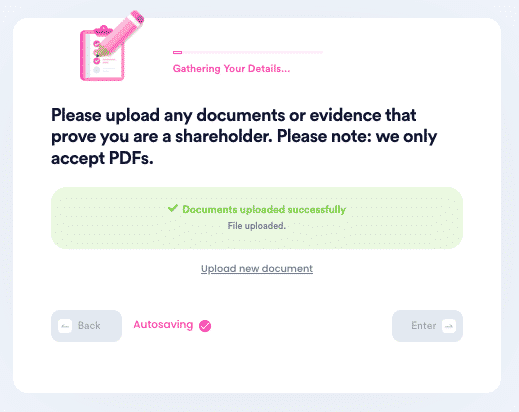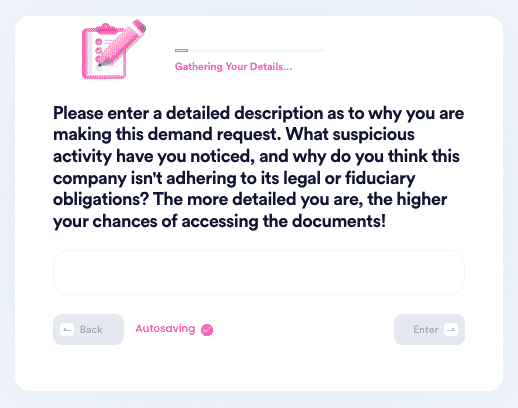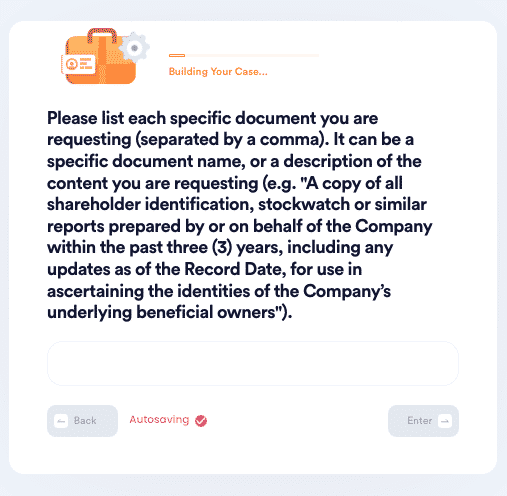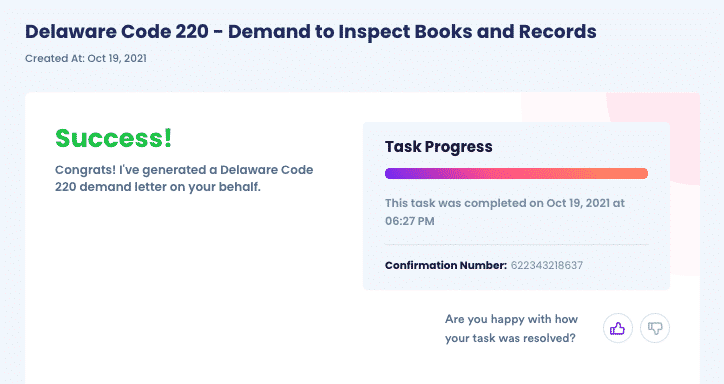How to File a Delaware Section 220 Request ?
Knowing on a Delaware corporation is the difference between getting all the information you want and need and not getting it. It is that simple. When you file your Delaware Section 220 request, you are making what the Delaware Court of Chancery calls a "Books and Records demand."
As a stockholder or director of a Delaware corporation, you have a right to know certain things under Title 8 Section 220 of Delaware General Corporation Law (DGCL.)
Knowing what you are entitled to find out about a corporation, knowing how to get that information, knowing what it costs, and how long it may take are essential elements of a successful request. Missing something out, making a request which does not meet Delaware submission standards, or even paying the fee with the wrong credit card will result in having to start again.
This article will help you learn how to file a Section 220 request.
What You Have a Right to Know Under Delaware Section 220
You have a right to know details about the corporation itself and how it is being run by those in charge. This may also include actions and communications by and with corporate fiduciaries and others who are involved in public or secret dealings concerning the corporation's future.
As a stockholder, you may simply want to learn more about:
- The books of account and Balance Sheet as part of your own investment portfolio management
- Future plans the directors may be considering that have not yet been raised at stockholder meetings.
- Possible malpractice or maladministration.
- Potentially illegal or negative programs the company is considering or may be actively involved in.
- Potential merger or takeover plans
It is very important, therefore, to be clear about which types of information requests shareholders can make under Delaware law.
A Basic Hurdle to Filing a Section 220 Request and Ways to Overcome It
You have a right to submit a Section 220 request to address many issues. But, as with all matters, poorly prepared requests, omitted details, and any confusing intent about why you want the information may result in denial. This wastes your and everyone else's time and squanders fee payments.
- It always pays, therefore, to do your preliminary research. That research gets most people over that hurdle. To begin with, you should know what your shareholder information rights are, plus the other rights you have as a shareholder.
- You should also know what rights and advantages Delaware shareholders obtain when they become part owners in a corporation.
The Basics of Filing a Delaware Section 220 Request
As well as knowing how to file under Section 220 of the Delaware General Corporation Law, you must be clear about:
- Who can file a Section 220 request
- What you are permitted to request
- Where to submit the Section 220 Request
- If there is a fee associated with your particular request, where you send the fee, how to pay the fee, and how much to pay.
You should know that Section 220 requests only apply to corporations and not to LLCs or LLPs.
If you are a director of a corporation, or you have a financial interest in it, you have a right to file the request. You may choose to do everything yourself or to hire an attorney to do it all for you. To do it yourself, we have listed the major points you must follow, as well as the address to send the request. We have also provided a Section 220 letter sample.
Another effective route, which will save time, money, and avoid all obstacles, is to ask DoNotPay to do it for you. But, first, let us go through the points to submit the request yourself.
How to File a Delaware Section 220 Request
To get basic entity information on the corporation, visit the Delaware Government website. The information is free of charge. You will receive:
- The entity name
- Its file number
- Date of incorporation
- The name, address, and phone number of its registered agent
If you also want the Certificate of Status, Certified Copy of a filed document, you must contact an approved Delaware agent and pay their fee.
Follow These Steps to Submit Your 220 Request
- Submit an affidavit saying the demand for information is made under oath. It is possible that persons not entitled to information may make a request. The affidavit is intended to prevent illegal or frivolous requests.
- Submit a cover memo with your (or your firm's) name and address. Use your company's letterhead if appropriate. This link helps you create your cover memo and submit your filing.
- You may file by mail to: Division of Corporations, John G. Townsend Building, 401 Federal Street, Suite 4, Dover, DE 19901.
- Submit all requested details and your reasons for wanting the information on the 8.5" by 11" paper.
- Documents should have 1" side margins, a 2" top margin, and a 1.5" bottom margin.
- All documents must be typed in black.
- List each document or type of information you want. Add the dates those documents were created by the corporation, or a person acting for it, or the dates they were filed with the state.
- Add all relevant information that will help those documents be located, including any other relevant information, in the comments section of the request.
- If the request is coming from a country outside the USA, the request must be apostilled, and gold sealed.
- Submit your fees with the request; otherwise, it will not be processed. The fee is determined by the size and detail of the request. Call the Division on (302) 739 3073 for further information.
- Pay only by Visa, MasterCard, Discover, American Express, or by check drawn on a US bank in US dollars made out to the Delaware Secretary of State.
If your Section 220 Delaware request is filed correctly, it will be recorded and then processed "as soon as we are able" to quote the division's explanation: You may choose an expedited service by calling the above phone number and selecting 0 from the main telephone menu.
The Available Options to File a Delaware Section 220 Request
One option is to learn the basics by reading up on the details in the links we have included. Another is to contact a law firm to do it for you. The first takes time and may result in failure because of errors. The second may also result in failure because what you say may not tie in close enough with what your lawyer puts on the request forms.
DoNotPay Has the Easiest and Most Successful Way to File a Section 220 Delaware Request
If you want to submit a Delaware Section 220 Request, but you either don't know where to start, or you just do not have the time to deal with it yourself, DoNotPay has you covered.
The Five Steps to Success
By giving DoNotPay this information, we will be able to handle everything for you. We are experts in Delaware Section 220 requests, so if we need more information before submitting it, we will ask for it. That way, you do not run the risk of wasting time and money.
Here's what you do:
- Search Delaware Code or Stock Inspection on DoNotPay.

- Confirm that the company you are hoping to inspect is a Delaware Corporation and that you are a stockholder.

- Tell us why you are requesting the information and what you plan on doing with it.

- Specify the names or types of documents you are requesting.

- That's it! DoNotPay will generate the formal request letter on your behalf and send it to the company.

Why Use DoNotPay
To sum it up, DoNotPay is:
| Fast | You don't have to spend hours trying to solve the issue. |
| Easy | You don't have to struggle to fill out tedious forms or keep track of all the steps involved in solving your problem. |
| Successful | You can rest assured knowing we'll make the best case for you. |
DoNotPay Works in Other Ways That Help You
You may have other issues with different entities. As well as submitting your 220 requests, we can help you to get information about other entities which are not covered by Section 220. You may, as a stockholder, need other information that Section 220 does not address. At DoNotPay, we will explain the differences, any obstacles, and we can then get to work on those other topics.
What Else Can DoNotPay Do for You?
Just to mention two other areas where we can help, you may want to:
- Learn more about the Freedom of Information Act.
Whatever your interest, problem, or need, we are here to help. As your first step, begin working with us on your


